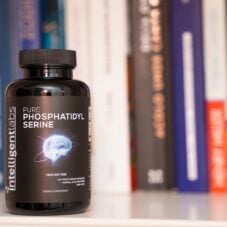Nootropics, Vitality
Phosphatidylserine: The Cortisol-Calming Nutrient Boosting Focus, Sleep and Stress Resilience
In today’s fast-paced world, stress isn’t just an occasional nuissance – for some, it’s a constant feeling that can hijack our focus, disturb our sleep and disrupt our resilience. But what if there was a natural way to recallibrate our body’s stress response, sharpen our minds, and reclaim restorative sleep? Enter Phosphatidylserine (PS), a phospholipid that’s getting attention for its significant ability to balance cortisol, enhance cognitive function, and foster emotional well-being.
Few understand the demands of high-stakes resilience better than Dr. Arpit Bansal – cancer surgeon, gut health specialist, and self-described Aquaman Biohacker. Drawing from his experiences in the operating room, his deep dive into longevity science, and his passion for biohacking, Dr. Bansal explores how PS acts as a biochemical bridge between stress and calm. In this article, Dr. Bansal shares not only the science behind PS but also his personal and clinical insights on how it can transform our relationship with stress, improve sleep, and even protect gut health.
Whether you’re an athlete pushing physical limits, a professional navigating relentless deadlines, or simply someone seeking to thrive in a stress-filled world, Dr. Bansal’s perspective offers a compelling case for why Phosphatidylserine might be the missing piece in your resilience toolkit.
My Journey with Stress and Resilience
My mornings rarely begin in the hospital. They begin in motion – with a run along the river, a swim that immerses me in the silence of water, or an ice bath that jolts me into clarity. These rituals are not luxuries; they are essential tools for resilience.
By the afternoon, I am in the operating theatre, performing complex laparoscopic cancer surgeries. Later, I counsel patients about gut health and longevity. By evening, I am both a doctor and a student again – reading, researching and writing.
Balancing these roles has taught me on lesson: resilience is the true measure of youth. And resilience depends heavily on how we regulate stress. Over the past few years, one molecule has caught my attention for its unique role in shaping how we respond to stress – Phosphatidylserine.
Cortisol: Friend and Foe
Cortisol is often described as the “stress hormone”, but the reality is more nuanced. In the right rhythm, cortisol is essential. It wakes us in the morning, sharpens focus, and gives us the energy to meet challenges. But when cortisol remains elevated well into the evening, it becomes a thief – robbing us of sleep, hijacking mood, and impairing memory.
I have seen this across patient groups:
- A corporate executive who lay awake at 3 a.m. despite complete exhaustion
- A young athlete whose sleep tracker revealed high nighttime heart rates and poor recovery
- Even medical colleagues who confessed being “wired but tired” after late surgeries.
The common denominator in all these cases was cortisol imbalance. This is where phosphatidylserine enters the story.
What is Phosphatidylserine?
Phosphatidylserine is a phospholipid – a special type of fat molecule that forms in our cell membranes, especially in the brain. It is not just structural, keeping neurons flexible and well-connected. It is also functional, influencing neurotransmitters, supporting cell communication, and fine-tuning the stress response.
Studies have consistently shown that PS supplementation can:
- Improve memory and recall in older adults (1)
- Enhance focus in children with attention difficulties (2)
- Improve mood, particularly when combined with omega-3 fatty acids (3)
- Blunt cortisol spikes after intense exercise (4)
How Phosphatidylserine Calms the Cortisol Storm
Many articles reduce PS’s effects to simple bullet points, but I find it important to unpack what these actually mean in the body:
Resetting the HPA Axis
The hypothalamic-pituitary-adrenal (HPA) axis is our central stress control system. Chronic stress keeps it “switched on”, leading to persistently high cortisol. PS helps restore balance by signalling to the brain that enough cortisol can be released, effectively resetting the rhythm.
Restoring Cortisol Feedback Loops
Our cortisol system works on feedback. When levels rise too high, receptors in the brain usually tell the adrenals to dial it back. In chronic stress these receptors become less sensitive. PS improves receptor sensititvity, allowing the body to respond more intelligently to stress.
Supporting Neurotransmitters
PS influences serotonin and dopamine – two key players in mood, motivation, and focus. By improving their activity, PS promotes emotional stability and sharper cognition without the sedation or “blunting” seen in many anti-anxiety medications.
Enhancing Stress Resilience
Instead of merely lowering stress hormones, PS helps you adpat to stress. For example, after acute exertion (like a marathon or an all-night shift at the hospital), it blunts the excess cortisol surge, allowing faster recovery without impairing performance.
This is why I often describe PS as turning stress into a friend rather than a foe.
My Cognitive Performance Stack
As a surgeon, I often need to transition from hours of intense microsurgery into administrative meetings and later into preparing for an international keynote. Fatigue is not an option.
On such days, my cognitive stack includes:
- 1,000 mg of Omega-3 (EPA + DHA) to nourish neuronal membranes
- 1,000 mg of Lion’s Mane Mushroom Extract to enhance neuroplasticity
- 100-200 mg of Phosphatidylserine to keep cortisol balanced.
Omega-3 provides the structure, Lion’s Mane supports new connections, and Phosphatidylserine stabilizes the stress response. They create what I call mental equity – an investment that pays off in clarity, creativity, and calm focus.
Case Study: An Athlete’s Recovery
A young triathlete I worked with struggled despite disciplined training. His sleep tracker consistently showed poor recovery, elevated heart rates, and frequent nighttime awakenings. The culprit: evening cortisol that refused to decline.
We introduced 200 mg of Phoshphatidylserine after his evening training sessions. Within three weeks, his sleep latency improved, awakenings reduced, and HRV scores (a marker for resilience) rose significantly. The remarkable part was that he did’t perform better by training harder, but by recovering smarter.
Sleep: The Most Underrated Benefit
One of the most profound benefits of PS lies in sleep. Cortisol and melatonin work in opposition – when cortisol stays high at night, melatonin cannot rise properly. By lowering evening cortisol, PS creates the hormonal conditions for deep, restorative sleep.
On nights after particularly stressful days, supplementing with PS consistently shows two results on my sleep tracker: my heart rate variability (HRV) improves, and the proportion of deep sleep stages increases. Patients report similar benefits: faster sleep onset, fewer awakenings, and waking up refreshed instead of groggy.
The Gut-Brain Connection
As a gut health specialist, I must emphasize that cortisol doesn’t just affect the brain – it disrupts the gut too. Chronic stress alters gut flora, increases intestinal permeability (the so-called “leaky gut”), and drives inflammation. This worsens anxiety, mood disorders, and even digestive issues.
By calming cortisol, PS indirectly protects the gut lining and preserves microbial diversity. This reinforces a principle I repeat often to patients: a calm gut fosters a calm mind.
Blue Mind vs. Red Mind
In my work, I often describe two states of being:
- Red Mind – fast, anxious, survival-driven
- Blue Mind – calm, creative, parasympathetic
Phosphatidylserine is a biochemical bridge between these states. By taming cortisol, it facilitates the shift from Red Mind stress into Blue Mind calm.
Personally, I find that combining PS with morning swims or underwater meditation amplifies this effect. Neuroscience calls this the activation of the default mode network; I call it the biology of calm clarity.
Final Toughts
Phosphatidylserine is not a magical pill. But in a world where stress has become chronic and recovery neglected, it is a remarkably powerful ally. For professionals juggling demanding careers, athletes chasing peak performance, and patients enduring the stress of illness, PS offers a safe, evidence-backed path to resilience.
In my personal life and clinical practice, it has become indispensable – not as a replacement for lifestyle habits like movement, mindfulness, and sleep hygiene, but as a synergistic tool that enhances their benefits.
References
(1) Crook TH et al., Neurobiology of Aging
(2) Hirayama et al., J Hum Nutr Diet
(3) Jorissen BL et al., Nutritional Neuroscience
(4) Hellhammer J. et al., Stress
📩 Want to learn more about this and other topics? Join our newsletter for exclusive content and perks!




